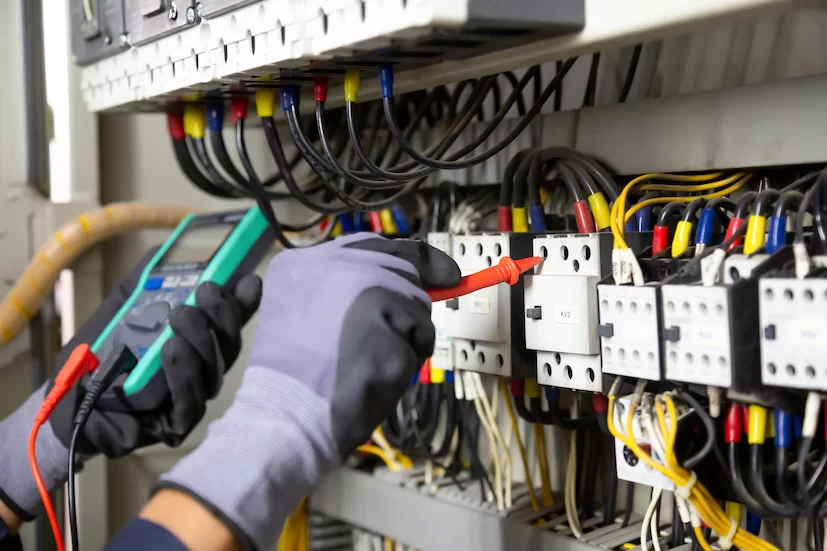In the electrifying world of the United Kingdom, electricians play a vital role in powering homes, offices, and industries. But have you ever wondered how much these skilled professionals earn? Let’s dive into the details and discover what affects their salaries, where they earn the most, and the perks of being self-employed versus being employed.
What’s the Average Electrician Salary in the UK?

electrician checking electric current with multimeter indoors, c
The average salary for a domestic electrician in the UK stands at a commendable £32,805 per year. This figure significantly surpasses the overall average salary in the UK, which is £28,080 according to the most recent Office for National Statistics (ONS) data. But that’s not all. With the right training and experience, electricians can elevate their earnings even further, either as specialists or by taking the entrepreneurial plunge and setting up their own electrical firm.








Factors That Impact Your Electrician Salary
A multitude of factors influence an electrician’s salary, much like in any other profession. Let’s break down the key contributors to your earnings as an electrician.
Experience
As in many fields, experience is a prime determinant of your salary. Newcomers who have recently completed their qualifications can expect to earn between £19,000 and £22,000 per year. On the other end of the spectrum, seasoned electricians can command salaries as high as £70,000 annually.
Customer Service Skills
Customer service is a paramount aspect of the trade professions. Your ability to connect with clients not only influences the amount of repeat business you receive but also affects your online reviews and ratings, which are more influential than ever in the digital age.
Availability and Willingness to Travel
Your willingness to travel can dictate the range of jobs available to you. Some electricians travel far and wide in pursuit of lucrative opportunities. Limiting your availability could restrict your earning potential. Therefore, it’s wise to gain exposure to a wide range of electrical work.
Problem-Solving Skills
Electricians often encounter complex issues in their work. Strong problem-solving skills are not only beneficial for addressing these challenges effectively but can also contribute to your career advancement.
Qualifications
Your qualifications, certifications, and ongoing training can impact your earning potential. Staying current with industry standards and innovations can open doors to higher-paying opportunities.
Competence and Abilities
Your competence in executing tasks efficiently and effectively will not only satisfy your clients but can also lead to more work and referrals.
Business Acumen
Running an electrical business requires more than just technical skills. It necessitates business acumen, including pricing, marketing, and managing operations. Your ability in this area can affect your salary, especially if you plan to start your own electrical company.
Where Do Electricians Earn the Most in the UK?

electrician salary in uk
Unsurprisingly, electrician salaries in the UK vary by region. Here’s a breakdown of the average salaries in different parts of the country, according to ONS data:
- London: Electricians in the capital earn the highest, with an average of £37,689.
- Wales: Electricians in Wales earn an average of £27,859.
- South East: Electricians in the South East pocket an average of £33,808.
- South West: In the South West, the average salary for electricians is £30,311.
- East Midlands: Electricians in the East Midlands earn around £32,859.
- West Midlands: The West Midlands sees an average electrician salary of £33,892.
- Yorkshire and the Humber: In this region, electricians earn approximately £33,563.
- North East: Electricians in the North East receive an average of £30,408.
- North West: The North West boasts an average salary of £31,564 for electricians.
- Scotland: Electricians in Scotland earn around £33,649.
Self-Employed vs. Employed Electricians: Who Earns More?
Recent research reveals that self-employed electricians tend to earn the most, surpassing their employed counterparts. On average, self-employed electricians pocket a handsome £51,200 per year, a substantial 56% more than the overall average electrician salary in the UK.
Several factors contribute to this earning potential, with the primary one being control over pricing. Self-employed electricians have the freedom to set their rates, provided that clients are willing to pay. Additionally, self-employed electricians can define their working hours, enabling some to work extended hours and accumulate substantial weekly earnings.
Self-employed electricians who effectively market themselves can generate a steady flow of work, both online and offline. This high demand allows them to select the most profitable tasks, such as electrical testing.
However, self-employment isn’t suitable for everyone. Some individuals find it challenging to stay motivated, working insufficient hours, while others struggle with the business aspects of the job, making it difficult to secure enough work.
Benefits of Self-Employment
- Decide Your Own Working Hours: Self-employed electricians have the flexibility to set their working hours according to their preferences.
- Set Your Own Pricing: Control over pricing enables the opportunity to maximize earnings.
- High Salary Potential: Self-employed electricians often enjoy higher average salaries.
Benefits of Being Employed
- Steady Income and Work: Employment offers a consistent income stream and job security.
- Defined Working Hours: Employed electricians typically have set working hours.
- Holiday and Sick Leave: Employment provides benefits like paid holidays and sick leave.
Career Progression Opportunities for Electricians
Electricians have a plethora of opportunities for career progression. While many start as apprentices or newly qualified assistants, the path to advancement is rich with options. Here are some potential avenues for growth:
- Promotions within a Firm: Experienced electricians can work towards promotions and take on leadership roles within their current firm.
- Starting Your Own Business: Many electricians choose to become self-employed and set up their own electrical business. This route offers independence and financial potential.
- Specialization: Electricians can also specialize in particular areas of commercial electrical work, such as renewable energy or advanced automation.
It’s common for electricians to gain experience working for an established firm before venturing into self-employment. This provides valuable insights into business management and technical skills.
Do electricians make good money UK? The average domestic electrician salary in the UK is £32,805 per year, which is considerably more than the overall average salary of £28,080 (according to the most recent ONS data). With the right training, electricians can go on to earn even higher salaries as specialists or by setting up their own firm.
Electricians typically make good money in the UK. In fact, electricians are in high demand in the UK and can earn a competitive salary. According to the National Careers Service, the median salary for electricians in the UK is around £30,000 per year. However, electricians with many years of experience and specialized skills can earn significantly more than the median salary. Additionally, self-employed electricians may have the potential to earn even more money, as they have the ability to set their own rates and take on as much work as they can handle. Overall, electricians in the UK have the potential to earn a good income.
What is the highest paying electrician job in UK?
It is difficult to say exactly what the highest paying electrician job in the UK is, as salaries can vary depending on a number of factors such as experience, location, and the specific employer. However, electricians who have many years of experience and specialized skills, such as those who work in the construction or engineering industries, may have the potential to earn higher salaries than other electricians. Additionally, self-employed electricians may have the potential to earn more than those who work for a company, as they can set their own rates and take on as much work as they can handle. Ultimately, the highest paying electrician job in the UK will depend on the specific skills and experience of the electrician.
- Wind turbine technician.
- Electrical technician.
- Maintenance electrician.
- Electrical foreman.
- Solar installer.
- Industrial electrician.
- Substation technician. National average salary: $67,807 per year.
- Automation technician. National average salary: $80,092 per year.
Are electricians on good money? The earning potential for those in skilled trade industries is great, as many trades have proven in these 2021 average figures. Electricians have proven to be one skilled trade that always performs as one of the highest earning trades, whether employed by a company or self employed.
How much does an electrician make UK 2022? Electrician Salary in the UK
The average salary for a Electrician is £32,100 gross per year (£2,110 net per month), which is £2,500 (+8%) higher than the UK’s national average salary. A Electrician can expect an average starting salary of £19,000. The highest salaries can exceed £45,000.


